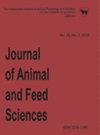Effect of grazing on composition, fatty acid profile and nutritional indices of the goat milk and cheese
IF 1.5
4区 农林科学
Q3 AGRICULTURE, DAIRY & ANIMAL SCIENCE
引用次数: 6
Abstract
The global goat milk production was approximately 19.9 mln t in 2019 and relatively continuously has been increasing during the last decades (FAO, 2021). Goat milk production has been growing, but the quantity of different types of goat milk products (typically cheese and yoghurt) has been also increasing year by year. In recent years, goat cheeses have gained increased popularity among consumers due to their nutritional value and health advantages. Small-scale farmers generally produce goat cheeses. This way, cheeses and other goat milk-based products have played an important role in the economic viability of farmers in the world. It is also necessary to add that goat cheeses are traditionally one of the crucial goat milk products produced, traded and consumed in large amounts in the world. Goat breeding and milk production are generally based on natural pastures in rural areas. After forests, grasslands and natural pastures are the most important ecosystems in the world because approximately 37% of the Earth’s terrestrial land surface (more than 50 mln km2, excluding Greenland and Antarctica) is covered by grasslands and natural pastures (O’Mara, 2012). Natural pastures are an essential resource for grazing-based animal production worldwide. In addition, sustainable small ruminant species (such as goat) breeding and keeping play an important role in the economy of marginal ABSTRACT. Twenty lactating Hungarian native goats were randomly divided into two groups to evaluate the effect of extensive grazing on the somatic cell counts (SCC), composition and fatty acid profile of milk and semi-hard cheese. The following important nutritional indices of goat milk and cheese fat were calculated: atherogenic index (AI), health-promoting index (HPI), hypercholesterolemic saturated fatty acids (HFA), hypocholesterolemic/hypercholesterolemic ratio (H/H), linoleic acid/α-linolenic acid ratio (LA/ALA) and thrombogenicity index (TI). The experimental period lasted for 38 days, encompassing the first four weeks as the period of adaptation to the natural pasture and the last ten days as the experimental period. The extensive grazing resulted in significantly higher concentrations of rumenic acid and lower n-6/n-3 ratio in milk (0.49 vs 0.67%, P < 0.01; 3.97 vs 1.49, P < 0.001) and in cheese (0.44 vs 0.63%, P < 0.001; 3.96 vs 1.54, P < 0.001). The extensive grazing significantly decreased the AI, HFA and LA/ALA, but on the other hand, increased the HPI and H/H indices in goat milk and cheese, respectively. The study results suggest that consumers have greater nutraceutical benefits from consuming milk and cheese from goats kept on natural pasture. Received: 20 August 2021 Revised: 11 November 2021 Accepted: 13 December 2021放牧对羊奶和干酪成分、脂肪酸组成及营养指标的影响
2019年,全球羊奶产量约为1990万吨,在过去几十年中相对持续增长(粮农组织,2021)。羊奶产量一直在增长,但不同类型的羊奶产品(通常是奶酪和酸奶)的数量也在逐年增加。近年来,山羊奶酪由于其营养价值和健康优势,在消费者中越来越受欢迎。小规模农民通常生产山羊奶酪。通过这种方式,奶酪和其他以羊奶为基础的产品在世界农民的经济生存能力中发挥了重要作用。还需要补充的是,山羊奶酪传统上是世界上大量生产、交易和消费的重要羊奶产品之一。山羊养殖和牛奶生产通常以农村地区的天然牧场为基础。继森林之后,草原和天然牧场是世界上最重要的生态系统,因为地球陆地表面约37%(超过5000万平方公里,不包括格陵兰岛和南极洲)被草原和天然草原覆盖(O’Mara,2012)。天然牧场是世界范围内以放牧为基础的动物生产的重要资源。此外,可持续的小反刍动物物种(如山羊)繁殖和饲养在边际摘要的经济中发挥着重要作用。将20只泌乳的匈牙利本地山羊随机分为两组,以评估广泛放牧对牛奶和半硬奶酪体细胞计数(SCC)、成分和脂肪酸组成的影响。计算了羊奶和干酪脂肪的以下重要营养指标:动脉粥样硬化指数(AI)、健康促进指数(HPI)、高胆固醇饱和脂肪酸(HFA)、低胆固醇/高胆固醇比值(H/H)、亚油酸/α-亚麻酸比值(LA/ALA)和血栓形成指数(TI)。试验期为38天,前四周为适应自然牧场的时期,后10天为试验期。广泛放牧导致乳中鲁梅尼酸浓度显著升高,n-6/n-3比例显著降低(0.49 vs 0.67%,P<0.01;3.97 vs 1.49,P<0.001)和奶酪中鲁梅酸浓度显著降低(0.4 vs 0.63%,P<0.001;3.96 vs 1.54,P<0.001,分别地研究结果表明,消费者食用饲养在天然牧场上的山羊的牛奶和奶酪有更大的营养益处。接收日期:2021年8月20日修订日期:2021 11月11日接受日期:2021 12月13日
本文章由计算机程序翻译,如有差异,请以英文原文为准。
求助全文
约1分钟内获得全文
求助全文
来源期刊

Journal of Animal and Feed Sciences
农林科学-奶制品与动物科学
CiteScore
2.10
自引率
0.00%
发文量
42
审稿时长
3 months
期刊介绍:
Journal of Animal and Feed Sciences (JAFS, J. Anim. Feed Sci.) has been published by the Kielanowski Institute of Animal Physiology and Nutrition, Polish Academy of Sciences in Jabłonna (Poland) since 1991. It is a continuation of the Polish-language journal Roczniki Nauk Rolniczych. Seria B, Zootechniczna published by the Polish Academy of Sciences since 1969.
JAFS is an international scientific journal published quarterly, about 40 papers per year including original papers, short communications and occasionally reviews. All papers are peer-reviewed and related to basic and applied researches in the field of animal breeding and genetics, physiology of nutrition, animal feeding, feed technology and food preservation. The journal distinguishes the multidisciplinary nature of physiological and nutritional sciences and so includes papers specialized in all fields connected with animal well-being, including molecular and cell biology and the emerging area of genetics.
 求助内容:
求助内容: 应助结果提醒方式:
应助结果提醒方式:


